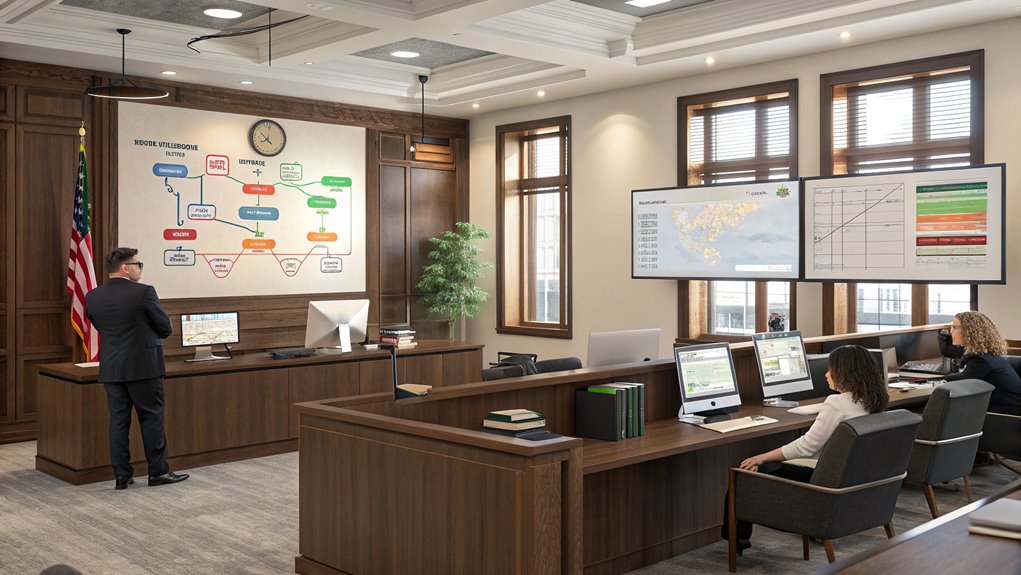Legal intake specialists manage sensitive first interactions with clients, balancing empathy with strict ethical boundaries. Their work requires fluency in legal terminology, strict confidentiality, HIPAA compliance, and secure data handling—all while maintaining professionalism and trust.
To meet these demands, training uses role-playing to build authentic empathy and communication skills, along with ongoing feedback and compliance audits to reinforce ethical standards.
With these strategies, specialists deliver respectful, confidential, and legally sound client interactions that uphold the profession’s highest standards.
Implementing Comprehensive Role-Playing Scenarios for Client Interaction Mastery
Role-playing exercises serve as immersive simulations that mirror real client intake challenges, enabling specialists to practice nuanced communication techniques and legal terminology relevant to varied case types. Additionally, integrating role-playing exercises with Seamless Integration into existing CRM workflows helps trainees apply learning directly to client records. This targeted training cultivates essential competencies like active listening, empathetic inquiry, and boundary management, which are critical for converting prospects into retained clients while safeguarding ethical standards.
These scenarios foster a psychologically safe learning environment where trainees refine their ability to handle sensitive topics such as family law disputes, personal injury claims, and other common legal inquiries. This method enhances specialists’ confidence and adaptability, ensuring they respond effectively to diverse client emotions and expectations during initial consultations.
Key components of effective role-playing programs include structured, scenario-driven training that integrates:
- Realistic client personas reflecting typical case categories and emotional states
- Scripted dialogues paired with flexible response options to cultivate authentic interaction skills
- Legal jargon and procedural knowledge aligned with the firm’s practice areas for domain expertise
- Techniques for empathetic question framing and active listening to build trust and rapport
- Ethical guidelines to reinforce professional boundaries and confidentiality standards
- Feedback loops and performance reviews for continuous skill refinement and accountability
Incorporating these elements into intake training transforms the specialist’s role from mere information gatherer to trusted client advisor, ready to navigate complex emotional dynamics with professionalism and care. That’s why investing in comprehensive role-playing frameworks not only enhances service quality but also drives client retention and firm reputation. By adopting this approach, legal teams position themselves to deliver exceptional initial experiences that lay the foundation for lasting client relationships. Our intake training should align with 24/7/365 phone coverage standards to ensure consistent, prompt response practices across all shifts.
Establishing Robust Confidentiality and Data Protection Protocols
Developing comprehensive confidentiality procedures is a cornerstone of intake specialist training, ensuring that client data remains secure through ethical guidelines and advanced technical safeguards. Intake responses are often uploaded directly to client systems by trained staff to ensure accuracy and continuity, and vendors often follow HIPAA compliant practices. Intake teams become adept at managing sensitive information responsibly, balancing transparency with privacy to protect client interests. This dual focus on behavior and technology mitigates risks of unauthorized disclosures and data breaches, which could otherwise compromise legal integrity and client confidence.
Integrating ongoing education on regulatory compliance and data security best practices empowers intake specialists to navigate evolving privacy challenges effectively. These protocols foster a culture of vigilance and professionalism, where specialists discern appropriate information sharing boundaries and utilize secure platforms to handle client interactions. In practice, this enhances both operational resilience and client satisfaction, reinforcing the firm’s reputation for trusted service.
Key protocol elements that fortify confidentiality and data protection include:
- Multi-factor authentication (MFA) systems combined with strict password complexity requirements to restrict unauthorized access to client management databases
- Transparent notice and consent frameworks that clearly inform clients how their personally identifiable information (PII) is collected, stored, and used in compliance with privacy laws such as GDPR and CCPA
- Encrypted communication channels like secure VoIP phone systems and protected messaging apps to ensure confidentiality during all client correspondence
- Phishing and social engineering awareness training enabling staff to identify and thwart sophisticated cyber threats targeting sensitive client data
- Regular audits and compliance checks to verify adherence to professional conduct rules and data protection regulations, minimizing legal exposure
- Role-based access controls limiting data visibility strictly to authorized personnel based on operational necessity and ethical boundaries
Cultivating a robust confidentiality infrastructure is not just about ticking compliance boxes—it’s about embedding trust and accountability at every client touchpoint. That’s why continuous training and adaptive security measures are indispensable in transforming intake specialists into vigilant guardians of client privacy. By prioritizing these practices, legal professionals can confidently uphold ethical standards while delivering secure, client-centered service that meets the demands of modern data protection landscapes. Additionally, intake processes can be enhanced through automated transfer of new client data into a firm’s CRM or CMS to ensure accurate records and efficient workflows.
Developing Advanced Communication Skills Through Empathy-Based Training
Transforming intake specialists into empathetic communicators goes beyond basic information gathering by cultivating emotional intelligence and nuanced interpersonal skills. This fosters the ability to discern and respond to complex client emotions with professionalism, refining the balance between empathetic engagement and maintaining appropriate boundaries. Distinguishing empathy from sympathy ensures specialists deliver genuine understanding rather than superficial pity, which is critical for building rapport in vulnerable client moments. Post-retainer support often includes 24/7/365 availability for ongoing client communications.
Active listening becomes a foundational skill that empowers specialists to fully absorb client concerns, convey validation, and adapt responses dynamically. Immersive role-playing scenarios simulate emotionally charged conversations, preparing specialists to manage challenging interactions with confidence and compassion. This comprehensive training ultimately enhances legal intake processes by improving accuracy, fostering trust, and elevating client experience.
Key components of empathy-based communication training include:
- Emotional recognition and regulation techniques that enable specialists to identify and appropriately respond to diverse client feelings
- Clear differentiation between empathy and sympathy to promote authentic connection without over-identification
- Active listening strategies such as reflective paraphrasing and verbal affirmations to demonstrate understanding
- Role-playing exercises replicating real-life client interactions that build resilience and conversational agility
- Establishment of permission-based communication environments encouraging vulnerability and authenticity while preserving professional boundaries
- Focus on trust-building through empathetic engagement that supports accurate information gathering and client comfort
Additionally, empathy-based intake can be complemented by 24/7 live chat services to capture qualified prospects and maintain client engagement outside business hours.
Integrating Technology Solutions for Secure Client Information Management
Modern legal practices must adopt sophisticated systems that balance security with usability to protect sensitive client information. Effective intake workflows depend on CRM/CMS Integration to automate data entry and reduce manual errors. Leveraging technology such as encrypted document management and automated backup solutions has become essential for maintaining trust and meeting stringent privacy standards. Empowering intake specialists with targeted training on these platforms ensures seamless adoption and mitigates risks associated with human error.
Comprehensive technology integration facilitates centralized case management and real-time access controls, enabling legal teams to collaborate securely and efficiently. That’s why employing multi-factor authentication and detailed audit trails has become the cornerstone of accountable information governance. These interconnected tools not only reduce manual errors but also provide robust compliance monitoring aligned with federal regulations and best practices.
Essential technology training components include:
- Document Management Systems that utilize role-based permissions to restrict access and maintain strict confidentiality according to team roles and case sensitivity.
- Encryption Protocols designed to safeguard privileged data with state-of-the-art cryptographic standards, ensuring compliance with federal privacy laws and cybersecurity frameworks.
- Automated Backup Systems which implement version control and secure data recovery workflows, preventing data loss during critical client intake procedures.
- Practice Management Integration featuring cloud-based platforms that unify case files, calendars, and contact directories into secure, accessible environments optimized for remote and hybrid work models.
- Multi-Factor Authentication and Audit Trails that enforce accountability by tracking access and modifications, supporting real-time compliance audits and enhancing data integrity.
Embracing these integrated technology solutions transforms client intake from a vulnerable bottleneck into a fortified, efficient gateway for legal services. Consistent training fosters a culture of security mindfulness and operational excellence. By prioritizing technology-driven confidentiality and streamlined workflows, legal teams can confidently navigate compliance landscapes while delivering superior client experiences. Additionally, creating and managing a Google Business Profile can enhance local visibility and support streamlined client intake workflows.
Creating Performance Metrics and Continuous Assessment Systems
Law firms benefit from integrating multi-dimensional performance indicators such as case intake volumes, client feedback scores, and conversion ratios to establish robust benchmarks. Coupling these metrics with real-time monitoring and compliance audits ensures that service quality and regulatory adherence remain paramount, fostering both employee development and organizational accountability.
Effective performance measurement incorporates key metrics such as:
- Case processing volumes to quantify workload and throughput
- Client satisfaction ratings to capture experiential quality and trustworthiness
- Call-to-case conversion ratios as a direct indicator of intake effectiveness
- Time-to-first-response benchmarks to optimize client engagement speed
- Complaint resolution tracking that safeguards ethical and professional standards
- Compliance audits and documentation quality reviews to identify training gaps and mitigate risks
Leveraging continuous assessment systems empowers law firms to maintain competitive advantage through data-driven decision-making. As a result, intake specialists receive targeted coaching based on error pattern analysis and utilization trends, which enhances both individual growth and firm profitability. That’s why embedding these strategic evaluation frameworks into daily operations is essential for sustaining high performance and exceptional client relationships. Many firms rely on 24/7 answering service to ensure time-to-first-response benchmarks are met and after-hours leads are captured.
Building Legal Knowledge Foundation for Accurate Case Evaluation
Intake specialists equipped with robust legal terminology and procedural understanding can navigate complex client communications seamlessly, reducing costly misinterpretations during initial screenings. Mastery of case classification and screening protocols streamlines the process of assigning matters to the right attorneys, optimizing resource allocation and accelerating case resolution. As a result, firms benefit from improved operational efficiency and heightened client trust.
Integrating advanced legal knowledge training transforms intake roles from basic data collection to strategic case evaluation hubs. That’s why a well-rounded curriculum encompassing diverse practice areas and triage techniques is crucial for specialists to confidently identify legal issues, deadlines, and financial considerations early on. This expertise ensures no critical information is overlooked, fostering accurate assessments that support superior legal outcomes.
A strategic legal knowledge foundation includes
- Comprehensive legal vocabulary and procedural nuances across multiple practice areas, enabling specialists to handle varied inquiries with authority
- Practice area-specific intake frameworks guiding precise, relevant questioning during client interviews
- Case viability analysis methods that swiftly uncover pivotal legal challenges, statute deadlines, and potential financial impacts
- Efficient triage protocols designed for immediate, accurate information capture upon initial client contact
- Risk assessment techniques to flag urgent matters requiring expedited attention or specialized attorney involvement
Embracing this knowledge paradigm elevates intake specialists as indispensable partners in the client journey. Their ability to accurately evaluate cases while maintaining professionalism not only reduces errors but also increases client satisfaction and firm credibility. In essence, investing in foundational legal knowledge equips your intake team to drive better case outcomes and foster lasting client relationships.
In Summary
Effective training for legal intake specialists hinges on a comprehensive blend of communication proficiency, ethical standards, and legal acumen. Incorporating role-playing scenarios and empathy-driven communication techniques equips specialists to handle sensitive client information with both professionalism and compassion. Additionally, emphasizing confidentiality protocols and integrating secure data management practices reinforce trust and compliance in client interactions.
Ongoing evaluation plays a crucial role in refining skills and ensuring adherence to ethical guidelines. Establishing continuous performance metrics and utilizing technology-driven assessment tools allow organizations to monitor and improve specialist effectiveness systematically. This dynamic approach fosters a culture of accountability and supports the development of legal intake professionals who consistently uphold integrity.
By adopting these strategies, organizations can cultivate intake specialists who excel in managing ethical client communications while leveraging modern technology solutions. Alert Communications exemplifies leadership in this domain, offering expertise in training programs designed to enhance ethical client handling. For organizations seeking expert guidance on legal intake specialist training best practices, partnering with a trusted provider ensures sustained excellence and compliance. Visit Alert Communications to learn more about comprehensive legal intake specialist training solutions.
Recent Posts
Sidebar
Request Service
Sidebar
Recent Posts
Get a quote
Let our 24/7 Answering Service Help Grow Your Firm
Landing Request Service
Landing Request Service

How We Guide You Every Step of the Way
- We handle your incoming calls and leads
- We follow up, quickly
- We process all information and hand it to you
- We manage scheduling efficiently
- Report, Analyze, Improve





